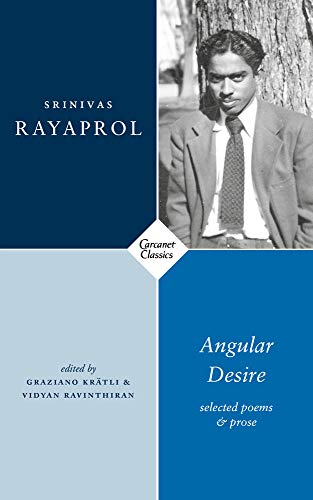angular desire selected poems von rayaprol srinivas (5 Ergebnisse)
FeedbackSuchfilter
Produktart
- Alle Product Types
- Bücher (5)
- Magazine & Zeitschriften (Keine weiteren Ergebnisse entsprechen dieser Verfeinerung)
- Comics (Keine weiteren Ergebnisse entsprechen dieser Verfeinerung)
- Noten (Keine weiteren Ergebnisse entsprechen dieser Verfeinerung)
- Kunst, Grafik & Poster (Keine weiteren Ergebnisse entsprechen dieser Verfeinerung)
- Fotografien (Keine weiteren Ergebnisse entsprechen dieser Verfeinerung)
- Karten (Keine weiteren Ergebnisse entsprechen dieser Verfeinerung)
- Manuskripte & Papierantiquitäten (Keine weiteren Ergebnisse entsprechen dieser Verfeinerung)
Zustand
Einband
- alle Einbände
- Hardcover (Keine weiteren Ergebnisse entsprechen dieser Verfeinerung)
- Softcover (5)
Weitere Eigenschaften
- Erstausgabe (Keine weiteren Ergebnisse entsprechen dieser Verfeinerung)
- Signiert (Keine weiteren Ergebnisse entsprechen dieser Verfeinerung)
- Schutzumschlag (Keine weiteren Ergebnisse entsprechen dieser Verfeinerung)
- Angebotsfoto (2)
Sprache (1)
Preis
- Beliebiger Preis
- Weniger als EUR 20
- EUR 20 bis EUR 40
- Mehr als EUR 40 (Keine weiteren Ergebnisse entsprechen dieser Verfeinerung)
Gratisversand
Land des Verkäufers
Verkäuferbewertung
-
Angular Desire: Selected Poems and Prose
Anbieter: WorldofBooks, Goring-By-Sea, WS, Vereinigtes Königreich
EUR 3,11
Währung umrechnenEUR 4,06 für den Versand von Vereinigtes Königreich nach DeutschlandAnzahl: 1 verfügbar
In den WarenkorbPaperback. Zustand: Very Good. The book has been read, but is in excellent condition. Pages are intact and not marred by notes or highlighting. The spine remains undamaged.
-
EUR 25,22
Währung umrechnenKostenlos für den Versand innerhalb von/der DeutschlandAnzahl: Mehr als 20 verfügbar
In den WarenkorbZustand: New. The first Western edition of the poetry of the great anglophone poet of postcolonial India, Srinivas Rayaprol.KlappentextrnrnThe first Western edition of the poetry of the great anglophone poet of postcolonial India, Srinivas Rayaprol.
-
Angular Desire: Selected Poems and Prose
Anbieter: Ria Christie Collections, Uxbridge, Vereinigtes Königreich
EUR 20,67
Währung umrechnenEUR 5,78 für den Versand von Vereinigtes Königreich nach DeutschlandAnzahl: Mehr als 20 verfügbar
In den WarenkorbZustand: New. In.
-
Angular Desire: Selected Poems and Prose
Anbieter: Revaluation Books, Exeter, Vereinigtes Königreich
EUR 16,86
Währung umrechnenEUR 11,61 für den Versand von Vereinigtes Königreich nach DeutschlandAnzahl: 2 verfügbar
In den WarenkorbPaperback. Zustand: Brand New. 187 pages. 8.50x5.50x0.50 inches. In Stock.
-
EUR 29,88
Währung umrechnenKostenlos für den Versand innerhalb von/der DeutschlandAnzahl: 2 verfügbar
In den WarenkorbTaschenbuch. Zustand: Neu. Neuware - Poetry Book Society Spring 2020 Special Commendation. A handful of writers defines the canon of postcolonial anglophone poetry in India. Srinivas Rayaprol has generally been omitted from the list. But his recently-published correspondence with William Carlos Williams and with publisher James Laughlin reveals an accomplished, complex, and enigmatic figure torn between opposing forces. His Brahmin Indian background and his profession as a civil engineer in a newly-independent country were at odds with his Western education, literary vocation, and demonic impulses. Such contradictions are expressed in his intense poetry, here restored to print, providing insights into Anglo-Indian and American writing, and a unique contribution to international literary modernism. He was influenced by Williams; he resisted (though at Stanford) the formal discipline of Yvor Winters. Touched by Stevens, he also read the European modernists and learned from them. His poetry marks a clear break with the established Indian lineage of British literary influences. Acknowledging the awkwardness of the language, Vidyan Ravinthiran cherishes 'a voice that isn't wholly and perpetually self-secure' in the poems.




